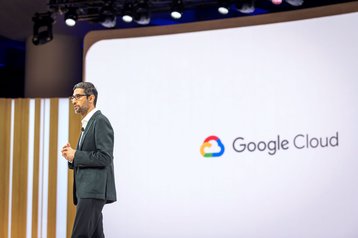Just as companies are ramping up their artificial intelligence (AI) deployments in areas ranging from customer service to manufacturing, the U.S. government is seeking to break up two of the biggest AI players, which could have repercussions for AI development and investment for years to come.
Last week, the Federal Trade Commission began its anticompetition trial against Facebook parent Meta for its social media dominance. It is seeking a divestiture of Instagram and WhatsApp.
In the same week, a Virginia judge ruled against Google, saying it acted illegally to maintain its dominance in online advertising technology. Google is also the subject of another antitrust lawsuit from the government for its search dominance. The government wants Google to give up its Chrome web browser, the most popular in the world.
“The ongoing antitrust trial against Meta and Google’s recent antitrust losses can substantially reshape the AI ecosystem due to their roles as major AI developers and innovators,” Ron Westfall, research director of communication networks at The Futurum Group, told PYMNTS.
There will be short-term turbulence, but the companies would pivot. It could also lead to “more streamlined and focused innovation,” similar to how AT&T’s breakup led to more telecom and internet innovation and gave rise to competitors that thrived, Westfall said. In 1984, the U.S. government broke up AT&T, widely known as “Ma Bell,” into seven regional telecom companies called “Baby Bells,” one of which is today’s Verizon.
Dev Nag, CEO of support automation firm QueryPal, believes a breakup will lead to more opportunities for smaller companies.
“When monopolistic firms like Google and Meta face breakups or restrictions, we often see an explosion of innovation from smaller players who finally have room to compete,” Nag told PYMNTS.
“The forced opening of critical resources — like Google potentially sharing search data with competitors — could democratize AI development in ways that accelerate progress beyond what any single company could achieve.”
These antitrust actions will likely result in a more resilient AI landscape and create pathways for the next crop of AI leaders who might otherwise be “smothered by the giants,” Nag added.
The AI ecosystem is dominated by a handful of large firms that control critical resources — massive datasets, computing power and top-tier AI talent — according to a study from the Center for Security and Emerging Technology at Georgetown University. These companies also invest heavily in research and development, which fuels advances in everything from consumer products to defense applications.
Apple is also facing its own antitrust trial over allegedly anticompetitive App Store policies, and Amazon is being sued by the FTC for allegedly using its dominant position in eCommerce to stifle rivals.
Read more: Meta’s Landmark Antitrust Trial Opens With Focus on 2020 Election
Breakup’s Impact on Innovation
Meta plays the spoiler in the AI race by offering open-source or freely available advanced AI models that can go head-to-head with those offered by AI leaders like OpenAI, Google, Anthropic and others. Meta’s 2-year-old Llama family of models is the most popular open-source AI models in the world, hitting 1 billion downloads as of March 18.
But Big Tech could become more cautious about investing in R&D under regulatory pressure, which dampens innovation, said Shawn DuBravac, CEO of the Avrio Institute who formerly worked at the Department of Justice’s antitrust division. He pointed to the “significantly reduced” investment by AT&T in its venerable Bell Labs after its breakup. Bell Labs — home to many tech breakthroughs and 11 Nobel Prizes — became a “shadow of its former self,” he told PYMNTS.
Mike Conover, CEO of Brightwave, said that while anticompetitive practices have no place in an efficient market, the deep pockets of Big Tech are needed to keep U.S. AI leadership. “Large-scale language model training benefits from large-scale investment,” he told PYMNTS. “Regulators and courts would do well to preserve our domestic ability to execute Manhattan Project-scale AI programs like those initiated by these companies.”
There is a risk of “regulatory overreach undermining U.S. AI market agility, particularly as China ramps up AI investment,” Westfall agreed, although noting that appeals will likely postpone any breakup action for years.
But Nag thinks otherwise. “Counterintuitively, these antitrust cases might strengthen America’s position against China in AI, not weaken it.” A more vibrant ecosystem with more competitors and resource constraints often produces more breakthrough innovations, he added.
Damian Rollison, director of market insights at SOCi, thinks the U.S. can take a page from Europe.
“The remedies of forced divestiture are blunt instruments that may not achieve the desired ends,” Rollison told PYMNTS. Instead, a better way is how the Europeans regulate, which “protects consumer rights and increases the responsibility of Big Tech over its content and influence.”
Breakup of Meta, Google May Spur New AI Innovation Wave, Analysts Say





